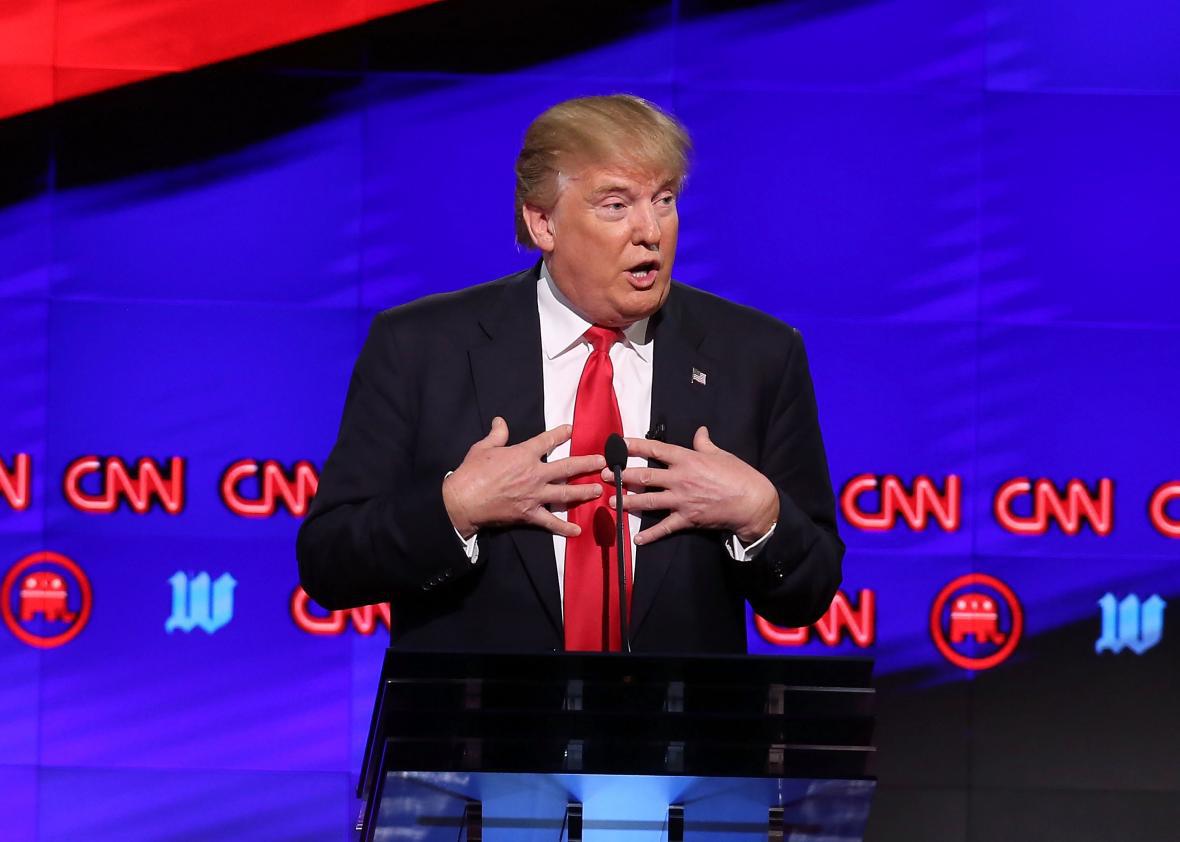The morning after the surprisingly civil 12th Republican debate, Donald Trump woke up and said, “I think we’ve had enough debates.”
“I think it will be nice to finish off with [Thursday’s debate]. … It was just a really nice way to finish off the debate season. But I really think it’s enough debates. I don’t think there’s any reason for the debates,” he added.
He makes a strong case.
I don’t say that just because I, personally, am tired of covering debate nights. That’s only a modest 80, 85 percent of it. It’s because, as Trump said Friday morning, “[H]ow many times do you have to give the same answer to the same question?” It’s not just that candidates have made their positions on the issues clear by this point. It’s that they’ve made their cases—substantive, stylistic, and comparative—fully. Ted Cruz, Marco Rubio, John Kasich, and Trump have used every argument for their own candidacies and against the others’ candidacies that’s available to them.
The Republican presidential primary has been fully litigated. A recognition that everything that’s going to be tried has been tried was implicit in each candidate’s self-presentation Thursday night.
Rubio has tried being Hopeful Marco, Angry Foreboding Marco, and Sassy Insult Marco. The latter two Marcos didn’t work for him. Neither did Hopeful Marco, really, but it was the one that established his thus far unmet potential. He returned to it Thursday night as his last, best hope for translating that potential into real support.
He spoke convincingly about the need not to alienate Muslims. When the topic turned to the anger of the electorate, he called on the party to use “the anger to motivate us, not to define us,” and he somehow parlayed that into one of his starry-eyed riffs about the glory of America. “My grandfather was born in 1899 before there were airplanes in the sky. One night in the summer of 1969, he watched a man set foot on the moon,” Rubio said. “You know what he said when he saw that? He said, ‘Americans can do anything. Americans can do anything.’ There is no problem before us we cannot solve, and we can solve it if we come together in a serious way, in this generation.” When Rubio wasn’t saber-rattling against various foreign entities, he stuck to these largely inclusive, albeit cheesy, set pieces. He did not bother to mock Trump, only disagree with him, and he and Cruz largely avoided their usual bickering about who is the real amnesty-lover. They’ve already been through it, time and time again.
Cruz, meanwhile, continued making his point that he is the one true conservative on the case. When he did attack, it was, as usual, to call out Trump for his heretical anti-conservative positions or his previous support for Democrats. He criticized Trump, again, for “funding liberal Democrats and funding the Washington establishment,” which makes it “very hard to imagine how suddenly this candidate is going to take on Washington.” Trump responded with something about how Cruz supports amnesty. Later, Cruz hit Trump, again, for saying that “he would not rip up this Iranian nuclear deal” or that he “wants to be neutral between Israel and the Palestinians.” Trump responded, again, that he is a deal-maker and that his goal is to make the best deals in all possible deal-making scenarios.
Kasich once again showed that he is the most qualified candidate in the field. Whether you agree with him or not, he is far more fluent in domestic and foreign policy issues than the others. Majorities of Republican primary voters will likely continue to not care. But the case has been made.
The 12th debate may have been the first in which you did not see any candidate attempt a game-changer or deploy some dramatic tactic intended to shake up the race. After 12 debates, everything—every revelation, every stylistic maneuver—has been tried. The remaining primary voters have their choice among hopeful conservative Marco Rubio, pure conservative Ted Cruz, experienced John Kasich, and whatever Donald Trump is. It was a two-hour closing argument.
